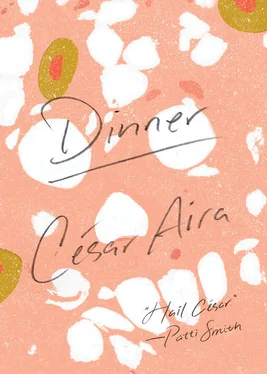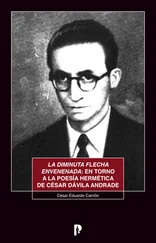This was encouraging news for the refugees in the Palacio. They were not alone, and something was being done. There was a certain irony, which nobody noticed, that it would be the members of the medical profession who would be leading the Resistance. Under less dramatic circumstances, someone would have been able to say, “Not satisfied with killing the living, now they want to kill the dead.”
The host from the Beyond had occupied the entire town, as well as outlying areas, small farms, ranches, even the caves along the cliffs where the tramps found shelter. Their tempo had increased, and all precautions had failed. What had happened? When they reached downtown, the living dead had simply changed their strategy: they abandoned the step-by-step approach they’d been following till then, and instead of pursuing a scorched-earth policy, they shot out in every direction to the periphery of the urban sphere, only to return, now exhaustively, from the countryside, into the nucleus of the more densely populated zone. There were so many of them that they were able to do this, and even so, they had spare troops. The maneuver, which the terrorized Pringlesians could not fail to notice, was even more overwhelming in its diabolical cunning for not having been organized by a central command. In this army of corpses, nobody gave or received orders, which seemed to come from a collective mind, an infallible automatism against which no defense was possible. Everywhere, between shouts and cries, people were simply giving up.
Nowhere was safe. Not inside or out, not in front or behind or to the sides, not up or down. There was only night, shadows convulsed by fear and traversed by random rows of streetlights; around the edges of this light, which only made the darkness denser, slipped unshrouded goose-stepping killers, preceded by a sour scent and heralded by the panting of hungry beasts.
Doctors and city officials (those who were left) were not the only ones looking for a solution. There were those who believed that all one had to do was wait for dawn, and then the danger would pass, as do all fantasies and fears engendered by the night. It was difficult to convince oneself that it was not a dream, and only the speed of the action prevented that idea from sinking deeper; if there had been time, every single Pringlesian would have argued in the depths of their hearts in favor of the oneiric, and they would have felt guilty for having involved their relatives and neighbors in their own nightmare. Some gathered in the living rooms of their homes in bathrobes or pajamas, woke the sleeping, turned on all the lights, conferred, talked on the telephone, played loud music: they emphasized the human, the familiar, and waited. For what? For the most part, they didn’t have long to wait. Even contrary to their most reasonable expectations, even shouting to one another: It can’t be! It can’t be! the doors would open and the oozing scarecrows would appear, those beings from the shadows who did not fear the light, equipped with their platinum straws, and then parents had the occasion to watch their children’s skulls being cracked open; husbands, the draining of their wives’ endorphins; all within the super-familiar and reassuring atmosphere of home.
There were also acts of resistance. In fact, they abounded, needless to say if one could overcome first impressions and take note of the rickety fragility of those poorly-assembled bags of bones scantily covered by the remains of entrails and putrid jellies. The passivity of terror had its limits. A town of farmers and truck drivers hardened by their daily encounters with Nature and man being wolf to man couldn’t surrender without putting up a fight. Some waged improvised struggles during the desperate fury of contact; others waited and readied themselves with sticks, irons, chains, and furniture to hurl. Half a dozen sons in the prime of their youthful vigor defending their old parents against one moldy arthritic corpse didn’t necessarily have to be battles lost before they began. Yet, they were.
Large defense groups were organized in certain nightclubs and restaurants, where they holed up in basements and on balconies, or in rooms whose doors were barricaded with piles of chairs and tables. The number of the living offered hope for salvation, but the number of the dead was always greater. “They will pay dearly for our endorphins,” they said, but ended up giving them away. And those who escaped could do nothing but run. Run blindly through dark streets, seek out open spaces, gain an extra minute, then another one, maybe it could be repeated, recover the instincts of deer, let the legs and lungs respond. But the streets, the street corners, the vacant lots were also responding; and the only response they gave was a proliferation of assailants swathed in old death and new terror.
As for the plan of the Clinic doctors, it had the advantage of initiative, but that was about all. From the get-go it was doomed by both intrinsic and extrinsic flaws. Moreover, they didn’t even manage to put it into practice due to an unexpected event that ended up providing the attackers with extra nourishment. It just so happened that while everybody was trying to get out of town, there arrived quite inopportunely a nourishing caravan of cars and SUVs packed full of dressed-up people: men in suits and tuxedos, women wearing long furs over low necklines and jewels. They had driven from an estate on the road to Pensamiento, and they were guests at a highly publicized wedding. The estate belonged to a rich and prolific French family; the bride was one of the eleven daughters of the owner, and the guests had come in from their other large estates in the south (the ones near Pringles were used only in winter), from Buenos Aires, and even from France. Right in the middle of the reception the patriarch suffered a heart attack, and without wasting any time, they piled him into an SUV and started off toward town. Since the others had no desire to continue the celebrations, they followed behind; his condition appeared to be serious; they feared he would die before they arrived, so the caravan sped up as if they were racing. On the way there, they tried to get in touch with the Clinic, and with doctors they knew, but all the numbers were busy, or didn’t answer. Thus they arrived, totally oblivious, in the middle of another “party,” which would end even more badly than the one that had just been ruined for them. They were in such a hurry that they didn’t notice anything strange when they got to town. The vehicles, around forty of them, reached the Clinic without any problem. Seeing family members pour out of the cars, shouting and demanding a stretcher and medical attention for a patient who was seriously ill surprised the doctors and nurses, who were expecting anything but that. The explanations they tried to give managed to only further confuse the already flustered minds of those who’d just arrived; admittedly it was difficult to explain out of the blue. The wedding guests were just starting to understand what it was all about, and to take measure of their colossal inopportuneness, when their skulls were being opened and their brains slurped up. The dead, who appeared in great numbers, worked from the outside in: first the relatives who had remained on the sidewalk out front, then those who had entered the hallways and waiting rooms, offices, rooms, laboratories, the intensive care unit, until they reached the sancta sanctorum of the operating room. Not even the heart-attack victim, with but a thin thread of life remaining, was spared. It was one of the best banquets of the night, that defenseless conglomeration of rich French partygoers — a class of people who make the production of endorphins their life’s work.
They didn’t all fall at once, however, because one car had separated from the retinue before reaching the Clinic (by prior consultation on cell phone with those driving the first vehicle), and it started to drive across town, utterly ignorant of the ongoing coven. It was on its way to the Church to get the priest. The entire family were fervent Catholics, and they had anticipated that they would need the succor of the final sacrament if the worst came to pass (how naïve). The person in charge of this mission was a brother of the dying man, the one with the most easygoing relationship with the ecclesiastical hierarchy; the bride and groom were riding in his car; they had climbed into it in the same way they could have climbed into any other, rushing as they were. They drove across town at full speed, without stopping at intersections, and, in part because of their speed, in part because they were distracted by their own emergency, they didn’t notice anything strange. If they saw a drooling corpse emerge from a house, they thought there was a costume party; if they saw another one tottering on a rooftop, they took it as an advertising gimmick. A group of young people running down the middle of the street? They were in a hurry. The brightly lit dining room of Hotel Pringles was full of lifeless bodies draped over the tables and sprawled on the floor. They didn’t look.
Читать дальше












